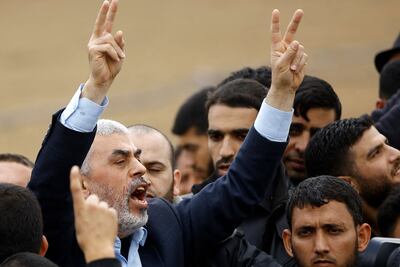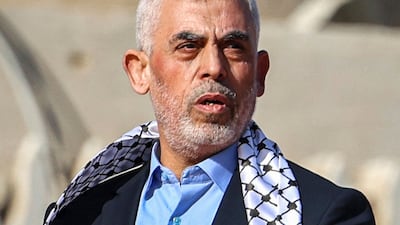Live updates: Follow the latest on Israel-Gaza
Israel's military on Thursday said it is looking into reports that it might have killed Hamas political leader Yahya Sinwar, mastermind of the October 7 attacks that killed about 1,200 people in southern Israel.
He has been the most-wanted Hamas militant in the Gaza Strip throughout the war, with a $400,000 dead-or-alive bounty on his head. Now, after more than a year of evading Israel's immense military machine, there is the strongest chance yet that he is dead.
No official confirmation has been made of Mr Sinwar's death but Israeli army radio has been told it is "highly probable" he has been killed. The radio station was citing unnamed security sources and gave no further details.

Israeli officials have long-believed Mr Sinwar was hiding – and commanding operations – from somewhere inside the extensive network of underground tunnels built by Hamas. Recent reports said he had resurfaced after weeks of being incommunicado.
He took over as political chief of the group after Ismail Haniyeh was assassinated in Tehran on July 31.
Mr Sinwar, 61, spent much of his adult life in Israeli jails before being released in a 2011 prisoner swap. He became the militant group’s leader in Gaza in 2017. After October 7, Israel described him as the “face of evil” and the mastermind of the raids.
Mr Sinwar, commonly known as Abu Ibrahim, grew up in Khan Younis, the main city in southern Gaza, and helped found Hamas in the 1980s. In 1985, he founded Al Majd intelligence and security apparatus that worked to identify Israeli collaborators among the population in Gaza. It was Mr Sinwar's harsh dealings with suspected collaborators that earned him the nickname The Butcher of Khan Younis.
In early 1988, he was arrested and given four life sentences for his role in the killing of two Israeli soldiers. He used the subsequent 23 years in prison, nearly four of which were spent in solitary confinement, to become fluent in Hebrew and learn about Israel's society and culture.
According to one of about 240 hostages captured on October 7, who was freed during an exchange between Hamas and Israel in November, Mr Sinwar visited captives held in Gaza's tunnel network early in the war.
"Hello, I am Yahya Sinwar. You are the most protected here. Nothing will happen to you," he reportedly told the group in flawless Hebrew.
Mr Sinwar positioned himself as a leader among inmates during his time in prison and led a series of hunger strikes to demand better conditions. He served several terms in the leadership body of the Hamas prisoners' union.
While incarcerated he translated several books on Israel's security apparatus and, like many Palestinian prisoners, published several of his own works by smuggling them out of jail in bits and pieces. One such work was his semi-autobiographical novel Thistle and Cloves, about a young Palestinian man navigating Israeli occupation after the 1967 war.
Israeli intelligence assessments from his time in prison describe Mr Sinwar as a “cruel, authoritative, influential” leader who had “unusual abilities of endurance” and an ability to “carry crowds".
In May, the chief prosecutor of the International Criminal Court Karim Khan said there were “reasonable grounds” to believe Mr Sinwar and Israeli Prime Minister Benjamin Netanyahu bore responsibility for war crimes and crimes against humanity. He said he was seeking arrest warrants for both men, among others.

In February, Israel's army released a video purporting to show the Hamas' chief, filmed on October 10, with members of his family in a tunnel in Gaza. The black and white images show a man alleged to be Mr Sinwar being led through a tunnel together with a woman and three children. It was claimed to have been the first footage of him since Israel’s war on Gaza broke out.
Israeli security officials have also extensively questioned hostages released by Hamas, hoping they could have heard or seen anything that might help them track him down.
In November, during the negotiations that led to a week-long truce and hostage and prisoner swap, Egyptian officials said Mr Sinwar occasionally stopped taking calls for days on end because of security concerns. He routinely had aides schedule calls from Egyptian and Qatari mediators or fellow Hamas leaders.
He used secure lines that he would frequently change and sophisticated jamming devices to avoid exposing his location to the Israelis. He often communicated with Hamas field commanders through coded written messages.
In 2021, shortly after the fourth war between Hamas and Israel since 2008 and following an attempt on his life, Mr Sinwar openly challenged Israel to assassinate him during a live news conference in the coastal territory.
“When I am done here, I will be walking for most of my journey home,” he said. “I will wrap this up in 10 minutes and it will take me another 10 minutes to get ready to leave, then I will walk for 20 or 30 minutes. That's nearly one hour or 3,600 seconds; enough for Israel to weaponise an aircraft and launch it,” he taunted. “Yet, I will not bat an eyelid."
Shortly after the news conference, Palestinian TV networks broadcast footage of the Hamas leader confidently walking the streets of Gaza, surrounded by aides and security guards while joyfully greeting and shaking hands with his supporters.
The last time he was seen in public is believed to be a year before the attack on Israel.


